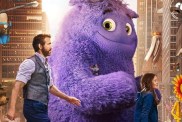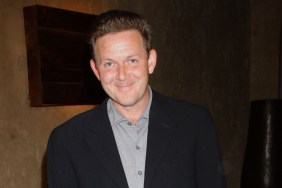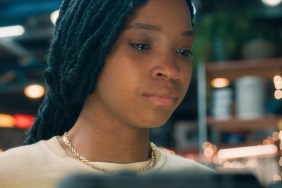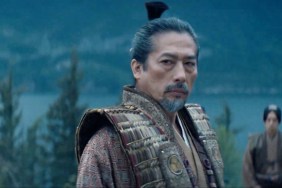
To the point of this idea of the film as a puzzle, I’ve seen some people questioning the opening lines, wondering how they are supposed to interpret it. The “Are you paying attention?” moment, and they wonder if it’s supposed to be perceived as a mystery and some have even said to me, “Is this supposed to be The Prestige?” Personally I think it’s exactly what you’re talking about, concerning the puzzle and mysterious nature, but also to the point of secrets, which I find to be a big thematic element of the entire film.
GM: That’s interesting and I almost don’t want to tell people how to interpret it, but I think what you’re saying is right. What we wanted to do was say from the very beginning that what you’re going to see is a bit of a puzzle, it’s going to be out of order, you’re going to be confused at moments, this is a film that’s going to ask a lot of its audience. We wanted to make a smart film, and we never wanted to make a film that condescended to its audience. Sometimes movies about scientists, or mathematicians, in my opinion, they’ll sometimes condescend to their audience and not expect the audience to be able to follow along with some of the various smart concepts its characters are generating.
It’s my least favorite moments in a movie about a scientist when there’s always this one scene where the scientist character will say something very technical and the character to their left will be like, “Woah, Bob! Say that again in English!” I fucking hate that line! I fucking hate that so much! I think it’s condescending and — treat your audience like adults and if there are confusing moments, that’s okay, they should be paying attention and [the opening] was sort of our way of saying this is Alan Turing’s story, it’s going to be told from Alan Turing’s perspective. It’s the one aesthetic principle behind the entire film and it was in the script and I think Morten took it to such a brilliant place in the way he shot it and put it together.
The aesthetic principle for every department was the film was Alan Turing’s story and every scene, every moment is from his perspective. It’s all written, narrated and shot from Alan Turing’s perspective, so the camera only moves when Alan’s body moves. The camera never rises above Benedict’s chin because you’re never looking down on him, you always want to be with him and Alexandre Desplat‘s wonderful score scores Alan’s response to every moment, not the other characters.
So the opening monologue, which was in the original draft of the script, it was the first thing I ever wrote for the movie and it was sort of a declaration this is going to get complicated, but we promise you it’s all going to make sense. Come along with us, we’re going to take you inside Alan Turing’s mind.
“There’s always one scene where the scientist character will say something very technical and the character to their left will be like,
“Woah, Bob! Say that again in English!”
I fucking hate that line!
I fucking hate that so much!”
Now the one thing I’ve argued with people about and it’s the one criticism against the movie I hate the most is this idea it’s “not gay enough”.
GM: [Laughing]
I’ve got a quote here from someone at The Guardian where the writer says, “[A] chaste note to a schoolboy crush is as steamy as it gets.” There’s more, but to me, this person is suggesting you have to see the person having sex or how will we ever know they are gay or understand their “gayness”? What is your response to this criticism?
GM: First of all, I’m happy to be talking about it, and I’d much rather this be the debate because this is a great debate to have. The representation of gay characters on screen is important for us all to think about because there are sadly too few representations of gay characters on screen in mainstream cinema. If Marvel starts making movies about gay superheroes then we’ll be in a really great place. We’re not at that place.
Yeah, yeah… you need to write Iron Man 4… [laughing]
GM: [Laughing] Yeah, if someone is dumb enough to hire me to write Iron Man 4 then I’ll say Tony Stark may have a late in life change of feelings about the loves in his life… But what I would say about that is I think it’s a silly question, it’s something you’d never say about a film about straight mathematician. You’d never say, “Oh, this is a movie about a straight mathematician, where’s the scene with him having sex to prove that he’s straight?” He’s just straight, that’s the way he is. Alan Turing is a mathematician and his identity, as a mathematician, was something foremost to his understanding of himself. How I was saying we wanted to make a film from Alan Turing’s perspective, I think he saw himself as a mathematician that just happened to be gay, not a gay mathematician. He was very unashamed of his sexuality, happily so, and just saw it as another preference.
Historically speaking, Alan Turing was celibate while at Bletchley Park, and not by choice. He described it in letters to friends as a “sexual desert”. He, very sadly, had to be in the closet because his homosexuality wasn’t just frowned upon, it was literally illegal, he would have been thrown in jail and he couldn’t risk it. And this is very sad and we wanted to dramatize the repression, he was forced to hide his sexuality from the world.
“If someone is dumb enough to hire me to write Iron Man 4 then I’ll say Tony Stark may have a late in life change of feelings about the loves in his life.”
**POSSIBLE SPOILER AHEAD** Another thing, and I’m not sure why I feel this way, but when you come to the end of the movie, you hinted at the cyanide at the very beginning, but at the end I almost feel — because of the subtlety with how his homosexuality is dealt with and talked about in the coda — I almost feel like had we seen him actually commit suicide it would have been more powerful. You probably disagree with that, I’m not sure if it was in the script, but I wanted to hear your impression.
GM: We never had a scene of him actually committing suicide. There was no, non-melodramatic, non-histrionic way of showing someone eating the apple. It would have been a laugh-out-loud moment.
Yeah.
GM: I don’t think it would have worked on screen. One thing I did script, we did shoot and then took out in editing was a scene of the detective coming in and finding the dead body and there’s an apple next to the bed and it’s covered in cyanide and there’s a lower-ranking detective that explains to our main detective what happened. We shot that and it felt — sort of in contrast to what you’re saying — we thought it was going to end up feeling powerful when we saw the film, but it wasn’t. It felt expositional. It felt like a scene that was just giving us information without any emotional value. We even had this bit where we zoomed in on the apple and Morten was like, “Does this feel like an Apple commercial to you guys? Why are we selling Apple computers right now?”
What we found was ending with him, with the kind of lyrical moment of him walking into the darkness, and this beautiful little smile, was a much better tribute to his legacy than —
Showing him dead on the floor?
GM: — than showing him dead on the floor, yeah. You felt the tremendous impact of his legacy more that way. Because that was the goal of the film, to provide a historical corrective to Turing’s treatment. Alan Turing has been so mistreated by history over the years, beginning with his persecution and suicide, and the way he was white-washed out of a lot of the histories of computer science and World War II.
I’ve been told I have one last question, what’s next for you? I know you’re writing another book and you adapted The Devil in the White City, how are those progressing and what exactly is this book about?
GM: My second novel, which I’m in the process of finishing, is another historical piece, it’s a true story, it’s a legal thriller set in New York in the 1880s and that’s all I’ll say about it now, but it’s another untold true story about a very real legal thriller.
Any idea when we can expect it?
GM: I’ve got to finish it first. I just turned in a second draft and hopefully by next fall, my publisher would be very happy if I did that.
Any new scripts in line? I read you’re doing something with Michael Mann at HBO.
GM: Yes, I’m writing a TV pilot at HBO with Michael Mann.
A crime drama I’m assuming?
GM: Uh, uh… at Michael’s request I will not say a single word. I love Michael very much and he’s one of my favorite filmmakers in the world and there is a level of secrecy about this project and I will respect his wishes.
The Imitation Game is in limited theaters now and expanding nationwide throughout the month of December and January. You can read my full “A-” review right here and watch the trailer below.









